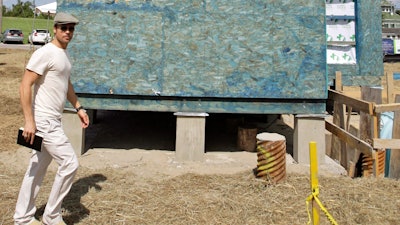
The six homeowners who sued Brad Pitt’s Make It Right Foundation over the faulty construction of housing it built for them have reached a US$20.5 million settlement with the apparently defunct charity.
According to attorneys who disclosed the settlement in August 2022, all owners of the more than 100 homes Make It Right designed and built are eligible for $25,000 in reimbursements for any previous repairs if a judge approves their request. The rest of the money will be distributed according to the severity of the problems the homes are having.
Global Green, a nonprofit with ties to Brad Pitt that wasn’t named in the lawsuit, is reportedly paying these funds.
As an urban geographer who researches housing development, I’ve been following Make It Right’s travails since 2018, when residents tried to get the New Orleans City Council involved and have municipal authorities inspect the homes. The situation has only deteriorated since then, highlighting the perils that can accompany nonprofit housing development.
After Katrina
Make It Right built a total of 109 eye-catching and affordable homes in New Orleans for a community where many people were displaced by damage wrought by Hurricane Katrina in 2005. The vast majority of the recently constructed homes are now riddled with construction-related problems that have led to mold, termites, rotting wood, flooding and other woes.
At least six are boarded up and abandoned. That is, the nonprofit that built houses with input from Frank Gehry and other prominent architects amidmuch fanfare for survivors of one disaster then ushered in another disaster.
Structural and other problems are making many residents fear for their health. Make It Right, despite what its name might suggest, failed for years to resolve these issues.
Supposedly sustainable housing
Located in New Orleans’ historically Black and low-income Lower Ninth Ward, this cluster of affordable homes built between 2008 and 2015 was unusual for several reasons. Notably, these residences were sold, rather than rented, to their occupants.
The architects who created these homes also tried to make them green and sustainable following a “cradle-to-cradle” philosophy that centers around the use of safe and reusable materials, clean water and renewable energy. All the homes had solar panels and energy-efficient heating and cooling systems.
Make It Right reported spending $26.8 million on the housing. To make the homes more affordable, they were sold for less than they cost to build – mostly around $150,000.
The nonprofit housing developer said its mission was to “improve the design and performance of affordable housing” and to “share best practices associated with the construction of such homes.” Make It Right fell short of its original goal of building 150 residences.
Make It Right also sought to revitalize the Lower Ninth Ward and bring people together. For example, it built a community garden and held regular meetings for the new homeowners.
Although some of these structures are not yet a decade old, my data gathered in late 2021 shows that only six of the original 109 remained in reasonably good shape. Most either have had partial repairs or have been completely renovated because of structural problems. Two were demolished because of severe mold problems.
Many of the houses lacked ordinary, essential features such as rain gutters, overhangs, waterproof painting or covered beams – all of which are necessary to withstand New Orleans’ subtropical climate and heavy rainfall.
Brad Pitt, who took credit for launching this organization in 2007 and often served as its public face in subsequent years, was still listed as a board member as of 2018.
Pitt’s lawyers argued that he could not be sued over the housing development’s failings, but a judge ruled in 2019 that the movie star would remain a defendant because of his role as Make It Right’s founder and chief fundraiser.
‘Completely in shambles’
I interviewed 14 residents, as well as seven urban planning experts who worked on the case. Additionally, I gathered data on the development and the homes by reviewing New Orleans property assessments and building permits. While staying in the Lower Ninth Ward myself, I personally took a census of the development and mapped its current state.
More than one resident told me they were initially very excited to be part of something bigger.
A Make It Right resident I’m calling Harry – I promised anonymity to all the residents I interviewed – had to move out of his home during major renovations that didn’t resolve all the issues he faces.
“They kind of got a second chance to make it wrong, not make it right again,” Harry told me. “They made it wrong twice.”
As of early 2022, six homes were vacant because of mold, rot, flooding and assorted structural issues. Hanna, a young first-time homeowner, walked away from her Make It Right residence, which was later demolished.
Only eight months after she moved in, Hanna recounted to me, her home “was completely in shambles.” Its flat roof could not hold up in the heavy rains of New Orleans, causing massive water intrusion and subsequent termite infestation and mold.
Hanna struggles with health problems caused by toxic mold. “I would like to say that there is always a silver lining, but with this situation, I really don’t see a silver lining because it really changed a lot of my plans that I had for myself in life,” she said.
Most of the residents I interviewed were dealing with a similar state of constant uncertainty.
They don’t know how much longer their home is going to hold up, whether the mold they were exposed to is affecting their health, and, worst, what would happen to their finances if they were to lose their home.
“There is just no turning this off,” Harry lamented. “Sometimes I think I’m sitting on a time bomb in this house.”
Others described always being “on edge,” the situation being “very stressful,” and a feeling of having been “taken advantage of on the biggest scale.”
A web of legal turmoil
Some residents also blame local authorities.
“We also have an issue with the city, because those who inspect (the home) and are supposed to keep it safe, did not,” said Claire, who tried to get New Orleans’ safety and permits department involved.
My many efforts to reach out to Make It Right by mail, email and visits in person were unsuccessful. When I went to its New Orleans office in December 2021, I encountered no staff. Instead, I witnessed a moving crew that had been hired by the organization to move its furniture and other property into storage.
The organization has apparently failed to file a 990 form, annual paperwork the Internal Revenue Service requires of all nonprofits, covering any year since 2018.
Who pays in the end?
Make It Right’s 2018 IRS filings indicate that it was spending more by then on legal services than on construction and maintenance.
Before this settlement, many residents had begun to pay for repairs out of their own pockets rather than wait for the nonprofit builder to resolve issues caused by its shoddy construction.
“I did most of the work myself,” Mario told me. “The ceiling tiles on the porch were falling off, and the wood was rotting, so I just replaced it, slowly, you know, so we could afford it.”
Despite their experiences, some residents said they still believe Make It Right’s founder had good intentions. “I don’t blame Brad Pitt,” said David, another resident. “He had a vision to build low-income houses and get people back in the Lower Ninth Ward.”
While nonprofit housing developers can play a vital role in creating affordable housing, many questions remain regarding their accountability in this case and others, in places like Chicago and Washington, D.C.
Mismanaged housing developments, even when constructed with lofty goals, only compound the hardships of the low-income people they purport to serve.
This is an updated version of an article published on Jan. 31, 2022.
This article is republished from The Conversation under a Creative Commons license. Read the original article here: https://theconversation.com/brad-pitts-apparently-defunct-foundation-reached-a-20-5-million-settlement-with-hurricane-katrina-survivors-over-its-green-housing-debacle-189200.






















